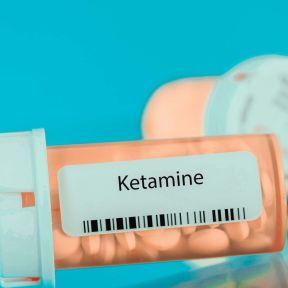KETAMINE-
Update on Ketamine via Telemedicine Delivery.
A breakthrough treatment for depression or a risky precedent? Here’s the latest.
Reviewed by Tyler Woods
In 2020, the federal government changed the rules to make it easier for providers to treat patients via telemedicine. One rule change allowed providers to prescribe controlled substances like ketamine without first seeing the patient in person.
The thinking was that, because the pandemic was raging, it was too dangerous for people to go to doctor’s offices for visits and to get their prescriptions.
Since that time, the number of people receiving ketamine via telemedicine has soared. The reason is clear. Several studies, as well as anecdotal evidence, in the last few years have shown ketamine to be highly effective for some people with treatment-resistant depression (TRD). It is also showing efficacy for bipolar disorder, PTSD, and certain other mental illnesses.
But depression seems to be the sweet spot. Many who have been suffering from debilitating TRD for years, and who have tried other medications with no success, are finally seeing their symptoms improve with ketamine. Some see a dramatic improvement over a period of days or even hours.
Another positive development? Ketamine obtained in this way—it usually gets sent in the mail in lozenge or tablet form when the prescription is filled—often costs far less than when a person receives the medication in person at a clinic.
So far, so good. However.
The risks of ketamine via telemedicine delivery
There are several serious downsides to this development. For one, when ketamine is taken chronically in high doses (which can happen when it’s taken at home in an unsupervised manner), it can cause severe bladder damage. In some cases, the damage requires surgical reconstruction of the bladder.
Ketamine can also be highly addictive for some individuals, and you can overdose on it. It can also dramatically raise heart rate and blood pressure when you take it, and it’s risky for those who live with certain kinds of psychiatric illnesses.
Maybe the biggest downside of all is that there is virtually no data on the long-term health effects of taking ketamine daily or every other day, as many who get it delivered via telemedicine do. (Many people receive their monthly dose of lozenges or tablets, take more of the medication each day than is prescribed, and run out early.)
Compare that lack of oversight to ketamine’s FDA-approved nasal spray form, called esketamine or Spravato. This is normally taken in a controlled clinical setting only once or twice a week for a set number of weeks under medical supervision.
Given all these upsides and downsides, what’s the best way forward with ketamine? Let’s start with the basics.
What is ketamine?
A synthetic substance, ketamine (pronounced “KEH-ta-meen”) was developed in the early 1960s as an anesthesia treatment to keep people from feeling pain from injury or during surgery. It’s still used today and is especially common in veterinary hospitals.
Classified as an anesthetic, ketamine causes feelings of dissociation and sedation in higher doses. It gained notoriety in the 90s as a club drug—people inject it, snort it, or add it to marijuana or cigarettes. Nicknames include "K," "Special K," and "Super K." Ketamine has also shown benefits in pain management for both chronic pain and acute pain in emergency room settings.
When taken to combat depression and other mental illnesses, ketamine can produce hallucinatory effects, visual and sensory distortions, out-of-body experiences, and euphoria or a “buzzed” state. Often, a ketamine “trip” lasts about two hours, though occasional side effects, such as unconsciousness and high blood pressure can be severe.
Many ketamine patients say that their sessions with the drug can act as a reset button for the brain. The drug allows them to detach from themselves, and many report profoundly pleasant thoughts and visualizations. Afterward, your daily problems can feel less oppressive, and the improved mood can last for weeks or longer.
A few cautionary words on telemedicine as a delivery method
As an addiction treatment clinician, I am wary of working remotely with patients, prescribing medications to them via telemedicine, and monitoring their progress and recoveries via videoconference. Why? Because it’s harder to do all those things remotely than if you’re seeing someone in person and can assess body language, attitude, hygiene, and other behaviors. It’s also easier for patients and providers to abuse the “virtual” delivery system.
So yes, in a perfect world where quality in-person care was available to everyone, that delivery method would win every time. But that’s not the reality. To extend our health and medical reach to those who otherwise wouldn’t access it, telehealth is vital, and it’s here to stay. On balance, that’s a great thing.
Telemedicine and ketamine
Here’s my take: Telehealth-based care (usually via video) works well for physical ailments like strep, skin rashes, or sinus infections. But things get more difficult with mental health because there are fewer physical symptoms to guide you. It gets dicier still when the medication that is prescribed for the illness is itself risky, as is the case with ketamine, because it’s harder to monitor remotely.
That said, the answer isn’t to shut down this delivery method for ketamine. Rather, we need to create regulations and safeguards that allow for the medication to be prescribed and monitored by a certified provider in a safe manner.
With that goal in mind, I offer the following.
4 recommendations on ketamine
Put clear, enforceable rules around that first visit with the provider. If the government doesn’t require a return to an in-person visit before prescribing controlled substances like ketamine, that first virtual visit must be comprehensive, recorded, and trackable by an oversight body. I hear all the time that these initial visits are as short as 30 minutes, and I can say with certainty that it is impossible to do a thorough mental health assessment with a patient in that amount of time.
Require certification of all providers and companies that offer ketamine via telemedicine delivery. This is how it works now with clinics that offer in-person FDA-approved Spravato nasal spray. Similar regulations need to be in place for the new providers offering ketamine via telemedicine.
Require addiction screening for all patients. Because ketamine can be addictive, providers and patients are playing with fire if patients aren’t thoroughly screened (this takes more than 30 minutes!) for addiction use past or present. This needs to happen, no exceptions. My recommendation is that a patient must be sober from drugs or alcohol for at least six months, if not a year, before a ketamine prescription is considered.
Make it mandatory that providers do frequent video checkups with their patients who take ketamine. This oversight is vital. Providers need to see how the patient is doing in order to make dosage adjustments. Video chats also allow for visual evidence to be shared, for example, the provider can ask to see a patient’s remaining dosages.
Key advice for patients
Always advocate for yourself, and remain vigilant about fraudulent or suspicious activity by your provider.
Remember, providers are not infallible. They sometimes make mistakes in judgment—or worse. There’s money to be made in this new-frontier area of medicine at the moment, which means you’re always going to get some bad characters involved.
If something smells fishy about the way medications are being prescribed by your provider, ask about it. Push back. Ask direct questions. Make inquiries. Do your due diligence. Google your provider to check on their credentials.
Bottom line: Be careful. Hold your provider to the highest possible standard. This is your (or a loved one’s) mental health we’re talking about, and there’s nothing more important than that.
KETAMINE-
Update on Ketamine via Telemedicine Delivery.
A breakthrough treatment for depression or a risky precedent? Here’s the latest.
Reviewed by Tyler Woods
In 2020, the federal government changed the rules to make it easier for providers to treat patients via telemedicine. One rule change allowed providers to prescribe controlled substances like ketamine without first seeing the patient in person.
The thinking was that, because the pandemic was raging, it was too dangerous for people to go to doctor’s offices for visits and to get their prescriptions.
Since that time, the number of people receiving ketamine via telemedicine has soared. The reason is clear. Several studies, as well as anecdotal evidence, in the last few years have shown ketamine to be highly effective for some people with treatment-resistant depression (TRD). It is also showing efficacy for bipolar disorder, PTSD, and certain other mental illnesses.
But depression seems to be the sweet spot. Many who have been suffering from debilitating TRD for years, and who have tried other medications with no success, are finally seeing their symptoms improve with ketamine. Some see a dramatic improvement over a period of days or even hours.
Another positive development? Ketamine obtained in this way—it usually gets sent in the mail in lozenge or tablet form when the prescription is filled—often costs far less than when a person receives the medication in person at a clinic.
So far, so good. However.
The risks of ketamine via telemedicine delivery
There are several serious downsides to this development. For one, when ketamine is taken chronically in high doses (which can happen when it’s taken at home in an unsupervised manner), it can cause severe bladder damage. In some cases, the damage requires surgical reconstruction of the bladder.
Ketamine can also be highly addictive for some individuals, and you can overdose on it. It can also dramatically raise heart rate and blood pressure when you take it, and it’s risky for those who live with certain kinds of psychiatric illnesses.
Maybe the biggest downside of all is that there is virtually no data on the long-term health effects of taking ketamine daily or every other day, as many who get it delivered via telemedicine do. (Many people receive their monthly dose of lozenges or tablets, take more of the medication each day than is prescribed, and run out early.)
Compare that lack of oversight to ketamine’s FDA-approved nasal spray form, called esketamine or Spravato. This is normally taken in a controlled clinical setting only once or twice a week for a set number of weeks under medical supervision.
Given all these upsides and downsides, what’s the best way forward with ketamine? Let’s start with the basics.
What is ketamine?
A synthetic substance, ketamine (pronounced “KEH-ta-meen”) was developed in the early 1960s as an anesthesia treatment to keep people from feeling pain from injury or during surgery. It’s still used today and is especially common in veterinary hospitals.
Classified as an anesthetic, ketamine causes feelings of dissociation and sedation in higher doses. It gained notoriety in the 90s as a club drug—people inject it, snort it, or add it to marijuana or cigarettes. Nicknames include "K," "Special K," and "Super K." Ketamine has also shown benefits in pain management for both chronic pain and acute pain in emergency room settings.
When taken to combat depression and other mental illnesses, ketamine can produce hallucinatory effects, visual and sensory distortions, out-of-body experiences, and euphoria or a “buzzed” state. Often, a ketamine “trip” lasts about two hours, though occasional side effects, such as unconsciousness and high blood pressure can be severe.
Many ketamine patients say that their sessions with the drug can act as a reset button for the brain. The drug allows them to detach from themselves, and many report profoundly pleasant thoughts and visualizations. Afterward, your daily problems can feel less oppressive, and the improved mood can last for weeks or longer.
A few cautionary words on telemedicine as a delivery method
As an addiction treatment clinician, I am wary of working remotely with patients, prescribing medications to them via telemedicine, and monitoring their progress and recoveries via videoconference. Why? Because it’s harder to do all those things remotely than if you’re seeing someone in person and can assess body language, attitude, hygiene, and other behaviors. It’s also easier for patients and providers to abuse the “virtual” delivery system.
So yes, in a perfect world where quality in-person care was available to everyone, that delivery method would win every time. But that’s not the reality. To extend our health and medical reach to those who otherwise wouldn’t access it, telehealth is vital, and it’s here to stay. On balance, that’s a great thing.
Telemedicine and ketamine
Here’s my take: Telehealth-based care (usually via video) works well for physical ailments like strep, skin rashes, or sinus infections. But things get more difficult with mental health because there are fewer physical symptoms to guide you. It gets dicier still when the medication that is prescribed for the illness is itself risky, as is the case with ketamine, because it’s harder to monitor remotely.
That said, the answer isn’t to shut down this delivery method for ketamine. Rather, we need to create regulations and safeguards that allow for the medication to be prescribed and monitored by a certified provider in a safe manner.
With that goal in mind, I offer the following.
4 recommendations on ketamine
Put clear, enforceable rules around that first visit with the provider. If the government doesn’t require a return to an in-person visit before prescribing controlled substances like ketamine, that first virtual visit must be comprehensive, recorded, and trackable by an oversight body. I hear all the time that these initial visits are as short as 30 minutes, and I can say with certainty that it is impossible to do a thorough mental health assessment with a patient in that amount of time.
Require certification of all providers and companies that offer ketamine via telemedicine delivery. This is how it works now with clinics that offer in-person FDA-approved Spravato nasal spray. Similar regulations need to be in place for the new providers offering ketamine via telemedicine.
Require addiction screening for all patients. Because ketamine can be addictive, providers and patients are playing with fire if patients aren’t thoroughly screened (this takes more than 30 minutes!) for addiction use past or present. This needs to happen, no exceptions. My recommendation is that a patient must be sober from drugs or alcohol for at least six months, if not a year, before a ketamine prescription is considered.
Make it mandatory that providers do frequent video checkups with their patients who take ketamine. This oversight is vital. Providers need to see how the patient is doing in order to make dosage adjustments. Video chats also allow for visual evidence to be shared, for example, the provider can ask to see a patient’s remaining dosages.
Key advice for patients
Always advocate for yourself, and remain vigilant about fraudulent or suspicious activity by your provider.
Remember, providers are not infallible. They sometimes make mistakes in judgment—or worse. There’s money to be made in this new-frontier area of medicine at the moment, which means you’re always going to get some bad characters involved.
If something smells fishy about the way medications are being prescribed by your provider, ask about it. Push back. Ask direct questions. Make inquiries. Do your due diligence. Google your provider to check on their credentials.
Bottom line: Be careful. Hold your provider to the highest possible standard. This is your (or a loved one’s) mental health we’re talking about, and there’s nothing more important than that.








